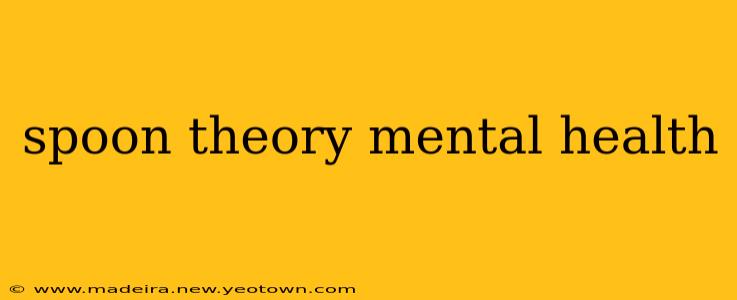Imagine this: You wake up each morning with a limited number of spoons. These aren't the kind you eat cereal with; they represent your energy, your mental fortitude, and your ability to cope with the demands of daily life. This is the essence of the Spoon Theory, a powerful metaphor created by Christine Miserandino to explain the realities of living with chronic illness, but it's also deeply applicable to understanding the challenges faced by individuals battling mental health conditions.
This isn't just about physical fatigue; it’s about the unseen cognitive load, emotional regulation, and the sheer effort required to navigate a world often designed for those without these invisible struggles. Let's delve into the intricacies of this theory and how it sheds light on the complexities of mental health.
What is the Spoon Theory and how does it relate to mental health?
The Spoon Theory, at its core, illustrates the unpredictable and often debilitating nature of chronic illness. Miserandino, who lives with lupus, uses the analogy of spoons to represent units of energy. Each task, no matter how seemingly small, requires a certain number of spoons. Simple acts like showering, eating, or even engaging in conversation can quickly deplete this limited supply.
For those with mental health conditions like depression, anxiety, PTSD, or ADHD, the Spoon Theory resonates deeply. The mental effort involved in managing symptoms—navigating intrusive thoughts, battling overwhelming anxiety, or simply focusing on a task—consumes a significant amount of energy. What might seem effortless to someone without these challenges can be exhausting and overwhelming for someone using their precious spoons.
How many spoons do you start with each day?
This is the crucial question, and the answer is highly individual. Some days, you might feel like you've got a full set of spoons—a rare and precious day indeed. On others, you might wake up feeling like you only have a few, or even none at all. The fluctuation is a core element of the experience—a fact that often leads to misunderstandings from those who don't live with chronic conditions or mental illness.
What are some examples of how spoons are spent in daily life?
Let's illustrate with concrete examples:
- Showering: This seemingly simple act can require many spoons for someone struggling with depression or chronic fatigue. The effort of getting out of bed, regulating emotions to begin the task, and maintaining the energy to complete it can be immense.
- Socializing: For someone with anxiety or social anxiety, even a short conversation can drain their energy. The mental preparation, the anxiety itself, and the effort of maintaining the conversation can deplete their spoons rapidly.
- Work/School: Concentrating, engaging with colleagues or classmates, and managing the emotional and mental demands of a workday or school day can be incredibly taxing, using a substantial number of spoons.
- Self-care: Ironically, self-care activities, like exercise or meditation, which are often recommended for mental health, can require a significant investment of spoons. On a low-energy day, these might simply be impossible.
How can the Spoon Theory help others understand mental health struggles?
The Spoon Theory is a powerful tool for empathy and understanding. By sharing this metaphor, individuals with mental health conditions can help those around them grasp the invisible struggles they face. It allows for a more nuanced understanding of why certain activities might seem impossible on some days, and why seemingly small tasks can feel monumental.
How can the Spoon Theory help individuals manage their mental health?
For individuals living with mental health conditions, the Spoon Theory offers a framework for self-awareness and management. It encourages mindful planning and prioritization, helping to conserve spoons for the most important activities. It validates the struggle and promotes self-compassion—understanding that limitations are not a personal failing but a consequence of the condition itself.
Conclusion:
The Spoon Theory, while a simple metaphor, provides a profound insight into the complexities of living with chronic illness and mental health challenges. It helps bridge the gap between the visible and invisible, fostering empathy, promoting self-understanding, and ultimately, empowering individuals to navigate their experiences with greater awareness and self-compassion. By understanding the limitations imposed by mental illness, we can create more supportive and understanding environments for everyone.

